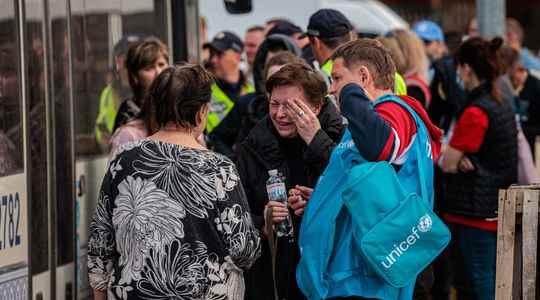Surrounded for several days by the Russian army, the civilians trapped in the basements of the huge Azovstal steel complex thought they would never be able to get out. But on Saturday May 7, Ukrainian President Volodymyr Zelensky announced that they had all been able to be extracted from the area, then from the city of Mariupol. Meanwhile, Moscow is preparing its show of military force for the parade on May 9, two and a half months after the start of the invasion in Ukraine.
- Mission to evacuate civilians “successful” in the Azovstal factory
“We have evacuated the civilians from Azovstal,” Ukrainian President Volodymyr Zelensky said with immense relief in a message broadcast on the evening of Saturday May 7. “This part of the humanitarian mission in Mariupol is accomplished.” He then announced to concentrate on the second phase, consisting in evacuating the Ukrainian soldiers still present in the steel complex of the port city, completely destroyed and controlled by the Russian army. To fulfill this objective, the Ukrainian authorities have officially requested assistance from the NGO Doctors Without Borders.
Details of life inside were given by Yevgenia Tytarenko, a military nurse, whose husband, a member of the Azov regiment, is still at the factory. “Many soldiers are in serious condition. They are injured and have no medicine,” explains the one who was able to maintain contact with her relatives inside. “Food and water are also lacking,” she adds.
- 60 missing in the bombing of a school in eastern Ukraine
On Saturday, the village of “Bilogorivka suffered an airstrike. The bombs hit the school and, unfortunately, it was completely destroyed,” regional governor Sergey Gaidai said on his Telegram account on Sunday. “There were a total of 90 people. 27 were saved… Sixty people who were in the school are most likely dead,” he said.
- Final rehearsals for Moscow before the big parade on May 9
Meanwhile, Russia is preparing a show of force for the traditional May 9 military parade commemorating the Red Army’s victory over the Nazis. The opportunity to show off its cohesion and its strategic weapons, while the whole world will have its eyes riveted on Moscow.
According to the Russian Ministry of Defense, “the plane of the Apocalypse”, an Ilyushin Il-80 specially designed to allow the president to rule the country from the air in the event of nuclear war, will fly over Red Square. Equipment capable of firing nuclear missiles will also parade, as an illustration of the threats of nuclear conflict that Putin has been addressing for several weeks to the West.
- The CIA has no evidence of the possible use of nuclear weapons by Russia
Despite a real threat, the CIA, the American intelligence agency, has declared, through the voice of its director, that it does not have concrete evidence indicating that Russia is preparing to use tactical nuclear weapons. The agency nevertheless believes that Vladimir Putin is “in such a state of mind that he cannot afford to lose” and that he will therefore “double his efforts to make progress in Ukraine”.
In addition, the CIA announced that China was following “attentively” the Russian invasion of Ukraine, in order to learn the right lessons for its own designs on Taiwan. Beijing was “surprised” by the setbacks of the Russian army and by the strong resistance of Ukrainian society, analyzed the boss of the main American intelligence agency. “I think they were particularly struck by the way the Atlantic Alliance came together to impose economic costs on Russia in response to its aggression.”
- President Zelensky meeting with G7 leaders
Ukrainian President Volodymyr Zelensky is due to take part in a videoconference meeting of G7 leaders on Sunday, as kyiv fears a final Russian assault on the last fighters besieged in Mariupol. Germany, which holds the presidency this year, considered that the war in Ukraine made “more important than ever the cohesion of the G7”. The adoption of possible new sanctions against Russia will be discussed, in particular that concerning the cessation of gas purchases.
- “Dizzying” violations of human rights according to the Council of Europe
At the end of a four-day visit to kyiv and its region, the Council of Europe Commissioner for Human Rights, Dunja Mijatovic, denounced on Saturday the “vertiginous” violations of human rights and international humanitarian law by the Russian army in Ukraine. “The names of Boutcha, Borodianka, Irpin or Andriivka have come to symbolize the horrible acts that have been committed here,” said the commissioner, whose visit had not been announced for security reasons.
